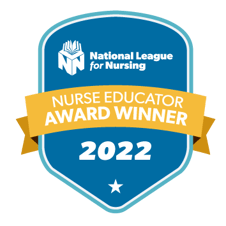In the 33 years she’s taught at the University of Colorado College of Nursing, Tammy Spencer, DNP, RN, earned numerous awards. Spencer was the recipient of the CU President’s Teaching Award 14 times and two-time winner of the Chancellor’s Teaching Award. She also received the Dean’s Excellence in Teaching Award early in her career in 1991.
On Sept. 14 (coincidentally, Spencer’s birthday), the National League for Nursing officially announced what students, faculty, and healthcare professionals throughout the state of Colorado already know: That Spencer is one of the best nursing educators in the country.
Dr. Spencer will be recognized among five national peers as a Nurse Educator of the Year at the NLN Education Summit in Las Vegas, Sept. 28-30. Recipients of the Nurse Educator of the Year Award best exemplify the NLN’s core values of “caring, integrity, diversity and inclusion, and excellence.”
Representing more than 2,500 nursing programs and over 22,000 nurse educators, the NLN has the largest membership of nurse educators in the country – making the award an exceptional honor for Spencer and for CU Nursing.
Spencer was nominated by CU College of Nursing colleagues Peggy Jenkins, PhD, RN, CNE and Gail Armstrong, PhD, DNP, who wrote that Spencer’s “remarkable distinction as an educator stems from her expertise, her deep commitment to her students, and her ability to continuously improve her teaching.”
Despite her high-profile role as the Assistant Dean of the Undergraduate Program at CU Nursing, Spencer opted to continue teaching because she believes it keeps her connected with students’ concerns and priorities – which she regards as foundational to nursing education.
Currently, she teaches the foundational Health Assessment course (in the first semester of the undergraduate program) and Med/Surg Care of Complex Patients course (taught in the last semester of the undergraduate program).
In their nomination submission for the NLN award, Jenkins and Armstrong wrote that Spencer’s “standards of excellence with an emphasis on critical thinking, and articulation of the importance of nursing care” leave a lasting impression on CU Nursing students.
Statistical evidence suggests that Spencer’s approach works. Under her leadership – and with the help of a highly devoted undergraduate faculty – CU Nursing pass rates have exceeded the national average. Graduates from CU Nursing also have high post-graduation employment rates of 94%, according to a recent alumni report.
|
National League for Nursing names CU Nursing Tammy Spencer among five national peers as Nurse Educator of the Year. |
When she first received notice of the NLN award, Spencer said she thought it was a “mistake” or a “scam” but quickly confirmed the validity of the honor. She regards the honor with characteristic warmth and humility that has endeared her to students and peers alike.
“I am humbled by this award because there are so many more educators who work equally hard at their craft,” Spencer says. “Students inspire and energize me. Teaching is a great source of joy.”
The hallmarks of education excellence
Part of what makes Spencer such a great teacher is that her work outside of the classroom as an assistant dean and her practice as a nurse at UCHealth University of Colorado Hospital Anesthesia Care Unit informs her work as an educator, and vice versa.
“I have a lot of different interests that have nursing in common and I think that gives me a unique perspective that hopefully translates to my teaching,” she says.
Spencer maintains that teaching the next generation of nurses keeps her finger on “the pulse of reality.”
“The students are using their life experiences to inform their patient care,” she says. “That keeps me current and informed in what’s going on in the world because they bring that to the classroom.”
Many years ago, Spencer coined an activity called “Think Like A Nurse,” where students apply knowledge and concepts covered in that day’s class to complex nursing scenarios. In essence, she cultivates a “culture of connectedness” that encourages students to consider themselves as a fabric woven into the complicated quilt of healthcare and the larger world.
Like many nursing leaders, Spencer is also becoming more active as an advocate in the healthcare policy realm and has had a profound positive effect on nursing statewide. At the height of the COVID-19 pandemic, Spencer led Colorado’s nurse educator community as a prominent voice in obtaining an executive order from Colorado Gov. Jared Polis to decrease clinical hours needed for undergraduate students to graduate.
“Because of her tenacity and leadership, over 250 undergraduate students graduated in 2020, providing a vital pipeline of nurses, who were desperately needed in the workforce,” Jenkins and Armstrong noted in their nomination application.
Spencer also helped implement practices that emphasized alternative clinical experiences when clinical placement sites stopped accepting nursing students due to the COVID-19 pandemic.
Jenkins and Armstrong both credited Spencer’s contributions at CU Nursing for facilitating “a faculty culture of inclusivity, student success, and continual improvement.” They also note that students adore Spencer’s approach because of the way she “shares evidence-based content specific to their development, as well as poignant stories from her own practice.”
“She has a willingness to connect with students not only as an educator, but as a mentor, a guide, and an advocate, says Michael Ferrara, an undergraduate currently enrolled in the University of Colorado Accelerated Nursing Program (UCAN). “She artfully explains scientific concepts with dynamic and colorful energy while being unflinchingly supportive and receptive to feedback.”
As someone who is scheduled to complete the program in December of this year, Ferrara said that he appreciates how Spencer has “created an inspiring and robust educational environment in which I feel supported and empowered to grow as a student and in the future as a nurse.”
Barbara Klontz, who also enrolled in the UCAN program to earn an accelerated BSN, concurs that she’s greatly benefitted from Spencer’s approach.
“Some teachers are charismatic speakers, some hold a wealth of knowledge, and some excel at breaking down facts and building knowledge,” Klontz says. “Dr. Spencer manages to do all of these at once.”
A lifetime of learning, teaching
Born and mostly raised in Tulsa, Okla., healthcare, and education are practically part of Spencer’s DNA. Her father, a professor in neuroanatomy, earned scholarships from place-to-place to fund his doctoral education. Her mother was a second-grade teacher.
“I grew up in a household that was education-focused,” she says. “Both of my parents were first-generation college graduates raised in rural Oklahoma, so the emphasis on education was a big part of my growing up.”
In part, she gravitated to nursing and education due to gender-based norms of the times.
“When I graduated from high school in 1979, there were more choices for women than there were in the 50s and 60s but still, nursing and teaching were popular choices,” she says. “I was drawn to it because I like taking care of people.”
After receiving her bachelor’s in nursing from the University of Oklahoma in 1984, she followed her husband, a rheumatologist, to what was then called the University of Colorado Health Sciences Center and earned her master’s in Adult-Medical Surgical at CU.
“When I started my career in critical care, I really enjoyed the patient-education and family-education piece,” she says. “That sort of spurred me on. I could see myself being an educator.”
After joining the CU system in 1989, she earned her Certified Nurse Educator certificate in 2009 and later pursued her certificate as an Adult Clinical Nurse Specialist, her designation as a Critical Care Clinical Nurse Specialist, and her Doctor of Nursing Practice – all from CU Nursing.
“Being a student and going through master’s and doctorate-level classes here gave me the student experience which feeds into my teaching and infuses everything else,” she says. “I think that attests to the fact that you choose a program because of the quality. Why wouldn’t I get my doctorate at CU? I had such a great experience and such great mentors.”
What’s next?
As someone who wears many hats, Spencer admits maintaining a healthy work-life balance can be challenging, but her family and friends help keep her motivated. She is currently collaborating on a manuscript about the case of RaDonda Vaught (a Vanderbilt nurse convicted this year of a fatal drug error) and its chilling effect on the nursing profession.
“It’s a complex world out there,” Spencer says. “You may have five patients and you are giving 35 medications at the same time. What are our safety nets and if those safety nets don’t work? Who has my back in these cases?”
Spencer is also part of a team collaborating with Fort Lewis College in Durango to offer admission to CU’s undergraduate nursing program to qualified applicants from the campus community where the population is 46% Native American. This project is near to Spencer’s heart in part because her great grandfather, a member of the Cherokee tribe, was approved to receive an allotment of land in the Indian Territory in Oklahoma. Today, the farm where her mother grew up is still in the family.
Whatever challenges the future holds, Spencer says that being part of the solution is what energizes her. It is also the element that she hopes will inspire generations of nurses to come.
“Things change rapidly. You have to embrace a little bit of chaos along with a whole lot of learning,” she says. “You can’t be a nurse and not love learning. And I’ve still got a lot to learn.”



